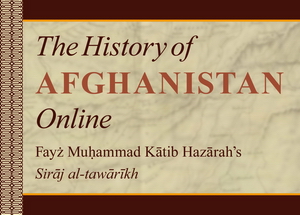History of Afghanistan
 The most important history of Afghanistan ever written (originally written in Persian), Siraǧ al-tawārīḫ or The History of Afghanistan. It was commissioned as an official national history by the Afghan prince, later amir, Habib Allah Khan (reigned 1901-1919). The author, Fayz Muhammad Khan, better known as “Katib” (The Writer), was a scribe at the royal court.
The most important history of Afghanistan ever written (originally written in Persian), Siraǧ al-tawārīḫ or The History of Afghanistan. It was commissioned as an official national history by the Afghan prince, later amir, Habib Allah Khan (reigned 1901-1919). The author, Fayz Muhammad Khan, better known as “Katib” (The Writer), was a scribe at the royal court.
For more than twenty years, he had full access to government archives and oral sources and thus presents an unparalleled picture of the country from its founding in 1747 until the end of the nineteenth century. The roots of much of the fabric of Afghanistan’s society today—tribe and state relations, the rule of law, gender issues, and the economy—are elegantly and minutely detailed in this immense work. (Source: Brill)
Inhalte
- The Sadūzāʾī Era, 1747–1843 (Volume 1)
- The Muḥammadzāʾi Era, 1843–1880 (Volume 2)
- The Reign of Amīr ʿAbd al-Raḥmān Kāhn, 1880–1889 (Volume 3, Part 1)
- The Reign of Amīr ʿAbd al-Raḥmān Kāhn, 1889–1893 (Volume 3, Part 2)
- The Reign of Amīr ʿAbd al-Raḥmān Kāhn, 1893–1896 (Volume 3, Part 3)
- Conclusion (Tatimmah) September 1896–May 1897 (Volume 3, Part 4)
- June 1897–July 1898 (Volume 4, Part 1)
- July 1898–October 1901 (Volume 4, Part 2)
- October 1901–July 1905 (Volume 4, Part 3)
- August 1905–February 1919 (Volume 4, Part 4)
- Indices to Volumes 1, 2, and 3 (Parts 1–3)
- Indices to Volumes 3 (Conclusion) and 4 (Parts 1–4)
Access Information
Members of a university can usually use an existing institutional registration. This procedure allows German universities, research institutions and academic libraries easy access without a special login. If your computer is not located in the campus area of your home institution, you should ask for further access options (e.g. local login via VPN).
In order to activate the access, institutions must include the national license in their portfolio. Test here whether this is already the case for your institution. If you land at a login page, please ask your library to activate the collection.
Researchers without access via a home institution can register for private access if they have their permanent residence in Germany. After registration you will receive your personal access data by post.